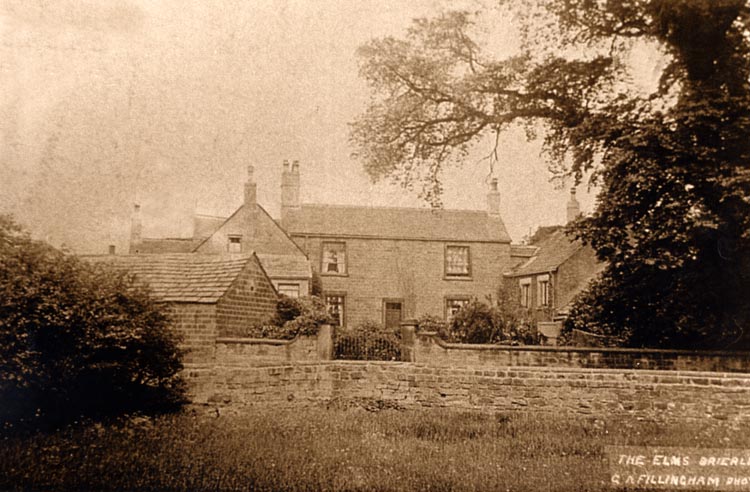My early visits
to Elms farm were simply to buy extra pints of milk fresh from the dairy
door at the farmhouse .The farm seemed such an interesting place, full of
various animals and strange machinery; that I gradually spent more and more
time there and became an official very junior helper.
The
farm was owned and run by Mr & Mrs Andrew Ashley. Andrew Ashley was a
distinctive figure that was always dressed in hairy tweed suits, a seasonal
hat and with his lassie dog at his heel. Mr Ashley’s sister Grace, a tiny
lady with red hair and very pale complexion, lived in the cottage at the
rear of the farm. Mrs Ashley’s brother Norman managed the daily routines on
the farm assisted by Charlie Day who lived across the road in the house next
to the old quarry. Norman and Charlie were helped at busy times by a variety
of casual workers who included me, my dad Alec, Tony Evans and several Wroes
and Vamplew’s.
The
layout of all the farm buildings was very good with the ability to move
easily from one area to another but each section could be shut off to allow
animals to be brought together for feeding, milking or treatment by the vet.
The farmhouse itself was split into working and living parts; having two
distinct entrances which were separated by a high wall and internally with
two staircases. Elms farm also hosted summer garden parties for the people
of Brierley on its large lawn next to the orchard. A lovely summerhouse
mounted on a turntable base was sited just by

Left shows
Elms Farm
The
farm was a mixed farm, which combined the usual arable crops with a dairy
herd, some beef cattle and poultry flock for eggs and meat. There were two
large working horses; a Clydesdale called Major and a Suffolk Punch called
Prince along with a feisty grey pony whose name I forget but who belonged to
Grace Ashley. A fearsome Lincoln Red bull lived in very secure accommodation
in the yard to be released as necessary to do his duties and re-secured to
the relief of all involved. Visiting vets were all very cautious in his
treatment but he still managed to inflict a few bruises. The dairy herd were
milked and housed in the winter in a long low building at the bottom of the
crew yard. This was a good place to be on a cold winters morning as it was
always warm. The downside was the smell and the need to avoid the source of
the smell, which arrived without warning. The huts where the poultry were
accommodated had been used previously for housing pigs and suffered from an
excess of rats. Norman solved the problem one night by temporarily moving
the chickens, then proceeding to connect all the metal feed containers to
the mains electricity, to return in the morning after turning of the power
to remove the numerous bodies, problem solved. Tractor power had arrived at
the farm in the shape of a Fordson Major, which was started by a handle and
ran on something called TVO after warming up on petrol. The tractor pulled
various ploughs and cultivators that would have given modern day health and
safety people a heart attack. They would not have liked the range of
grinding and cutting machinery that was housed in the stone barn and driven
by a series of flapping and unguarded belts.
The
big event in the farming year was when the corn stacks were threshed as this
was before the days of combine harvesters. The threshing and baling machines
that I think were based at Cudworth toured the surrounding farms in a long
convoy pulled by a very large green Field Marshal tractor. Several days of
intense activity followed with the grain being bagged off for feed or sale
and the remaining straw baled for feed or bedding.
The
Ashley family retired from farming in the late fifties and Elms farm was
sold to Frank Lord and his family. I can remember the day clearly when all
the farm machinery and animals were auctioned off as I had been given
permission for a day off school to attend.
Back to
MEMORIES
index
page